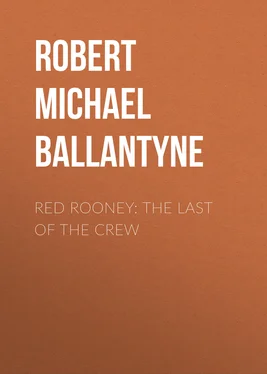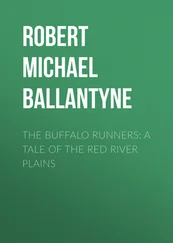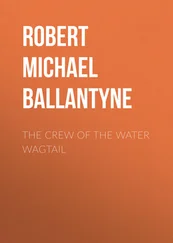Robert Michael Ballantyne - Red Rooney - The Last of the Crew
Здесь есть возможность читать онлайн «Robert Michael Ballantyne - Red Rooney - The Last of the Crew» — ознакомительный отрывок электронной книги совершенно бесплатно, а после прочтения отрывка купить полную версию. В некоторых случаях можно слушать аудио, скачать через торрент в формате fb2 и присутствует краткое содержание. Жанр: Детские приключения, literature_19, foreign_antique, foreign_prose, foreign_children, на английском языке. Описание произведения, (предисловие) а так же отзывы посетителей доступны на портале библиотеки ЛибКат.
- Название:Red Rooney: The Last of the Crew
- Автор:
- Жанр:
- Год:неизвестен
- ISBN:нет данных
- Рейтинг книги:5 / 5. Голосов: 1
-
Избранное:Добавить в избранное
- Отзывы:
-
Ваша оценка:
- 100
- 1
- 2
- 3
- 4
- 5
Red Rooney: The Last of the Crew: краткое содержание, описание и аннотация
Предлагаем к чтению аннотацию, описание, краткое содержание или предисловие (зависит от того, что написал сам автор книги «Red Rooney: The Last of the Crew»). Если вы не нашли необходимую информацию о книге — напишите в комментариях, мы постараемся отыскать её.
Red Rooney: The Last of the Crew — читать онлайн ознакомительный отрывок
Ниже представлен текст книги, разбитый по страницам. Система сохранения места последней прочитанной страницы, позволяет с удобством читать онлайн бесплатно книгу «Red Rooney: The Last of the Crew», без необходимости каждый раз заново искать на чём Вы остановились. Поставьте закладку, и сможете в любой момент перейти на страницу, на которой закончили чтение.
Интервал:
Закладка:
Angut was shrewd also and profound of thought, insomuch that, mentally, he stood high above his kinsfolk. He seemed to see through his fellows as if their bosoms and brains had been made of glass, and all their thoughts visible. Ujarak knew this also, and did not like it. But no one suffered because of Angut’s superior penetration, for he was too amiable to hurt the feelings of a mosquito.
After all that we have said, the reader will perhaps be prepared to expect that Angut never opened his mouth save to drop words of love and wisdom. Not so. Angut was modest to excess. He doubted his own wisdom; he suspected his own feelings; he felt a strong tendency to defer to the opinion of others, and was prone rather to listen than to speak. He was fond of a joke too, but seldom perpetrated one, and was seldom severe.
While Ujarak was speaking, Angut listened with that look of unmoved gravity with which he always met a new thing or idea, and which effectually concealed his real feelings, though the concealment was unintentional. But when at last the wizard came to the most distasteful part of his discourse, namely the message from Reginald Rooney, that, on the occasion of his visit to the camp, he would take up his abode with Angut, that hero’s countenance lighted up with surprise, not unmingled with pleasure.
“Is Ujarak sure that the Kablunet said this?” asked Angut.
“Quite sure,” replied the wizard.
“Huk!” exclaimed Angut, by which exclamation you may be sure that he meant to express much satisfaction.
“But,” continued the wizard, “the Kablunet is ill. He is thin; he is weak. He wants rest. I have consulted with my torngak, who tells me he will get better soon if we do not trouble him.”
At this point Ujarak glanced at Angut, but that worthy’s countenance had resumed its look of impenetrable gravity.
“We must not worry him or go near him for some days,” continued the wizard. “We must let him alone. And this will not try our patience, for my torngak tells me that seals have come. Yesterday I went to the house of the great Fury under the sea, and wrestled with her; and my torngak and I overcame her, and set many of the seals and other animals free.”
“Huk!” exclaimed the assembly, in gratified surprise.
Lest the reader should feel some surprise also, we may as well explain what the Greenlanders believed in former times. They held, (perhaps they still hold), that there were two great spirits—the one was good, named Torngarsuk; the other was bad, and a female—a Fury—without a name. This malevolent woman was supposed to live in a great house under the ocean, in which by the power of her spells she enthralled and imprisoned many of the sea monsters and birds, thus causing scarcity of food among the Eskimos. The angekoks claimed to have the power of remedying this state of things by paying a visit to the abode of the Fury.
When an angekok has sufficient courage to undertake this journey, his torngak, after giving him minute instructions how to act, conducts him under the earth or sea, passing on the way through the kingdom of those good souls who spend their lives in felicity and ease. Soon they come to a frightful vacuity—a sort of vasty deep—over which is suspended a narrow wheel, which whirls round with great rapidity. This awful abyss is bridged by a rope, and guarded by seal sentinels. Taking the angekok by the hand, his torngak leads him on the rope over the chasm and past the sentinels into the palace of the Fury.
No sooner does the wicked creature spy the unwelcome visitors than, trembling and foaming with rage, she immediately sets on fire the wing of a sea-fowl, with the stench of which she hopes to suffocate angekok and torngak together, and make both of them captives. The heroes, however, are prepared for this. They seize the Fury before she has succeeded in setting fire to the wing, pull her down, and strip her of those amulets by the occult powers of which she has enslaved the inhabitants of ocean. Thus the spell is broken, for the time at least, and the creatures, being set free, ascend to their proper abodes at the surface of the sea!
After this explanation the reader will easily understand the flutter of excitement that passed through the assembly, for, although feasting at that moment on a walrus, they had suffered much during the latter part of that winter from the scarcity of animals of all kinds.
But Angut did not flutter. That peculiar man was an incorrigible sceptic. He merely smiled, and, chucking a rotund little boy beside him under the chin, said, “What think ye of that, my little ball of fat?” or some Eskimo equivalent for that question. Our intelligent wizard had not, however, ventured on these statements without some ground to go on. The fact is, that, being a close observer and good judge of the weather, he had perceived a change of some sort coming on. While on his way to the hut of Okiok he had also observed that a few seals were playing about on the margin of some ice-floes, and from other symptoms, recognisable only by angekoks, he had come to the conclusion that it would be safe as well as wise at that time to prophesy a period of plenty.
“Now I would advise,” he said, in concluding his discourse, “that we should send off a hunting party to the south, for I can tell you that seals will be found there—if the young men do not put off time on the way.”
This last proviso was a judicious back-door of escape. Slight delays, he knew, were almost inevitable, so that, if the hunt should prove a failure, he would have little difficulty in accounting for it, and saving his credit. The most of his credulous and simple-minded hearers did not reflect on the significance of the back-door remark, but Angut did, and grinned a peculiar grin at the little fat boy, whom he chucked a second time under the chin. Ujarak noted the grin, and did not like it.
Among the people there who gave strongest expression to their joy at the prospect of the good living in store for them, were several young and middle-aged females who sat in a corner grouped together, and conveyed their approval of what was said to each other by sundry smirks and smiles and nods of the head, which went far to prove that they constituted a little coterie or clique.
One of these was the wife of Simek, the best hunter of the tribe. Her name was Pussimek. She was round and short, comely and young, and given to giggling. She had a baby—a female baby—named after her, but more briefly, Pussi, which resembled her in all respects except size. Beside her sat the mother of Ippegoo. We know not her maiden name, but as her dead husband had been called by the same name as the son, we will style her Mrs Ippegoo. There was also the mother of Arbalik, a youth who was celebrated as a wonderful killer of birds on the wing—a sort of Eskimo Robin Hood—with the small spear or dart. The mother of Arbalik was elderly, and stern—for an Eskimo. She was sister to the great hunter Simek. Kannoa, a very old dried-up but lively woman with sparkling black eyes, also formed one of the group.
“Won’t we be happy!” whispered Pussimek, when Ujarak spoke in glowing terms of the abundance that was in prospect. She followed up the whisper by hugging the baby.
“Yes, a good time is coming,” said the mother of Ippegoo, with a pleasant nod. “We will keep the cooking-lamps blazing night and—”
“And stuff,” rejoined Pussimek, with a giggle, “till we can hold no more.”
“Do you want to grow fatter?” asked the mother of Arbalik in a sharp tone, which drew forth a smothered laugh all round, for Pussimek had reached that condition of embonpoint which rendered an increase undesirable.
“I would not object to be fatter,” replied the wife of Simek, with perfect good-humour, for Eskimos, as a rule, do not take offence easily.
Читать дальшеИнтервал:
Закладка:
Похожие книги на «Red Rooney: The Last of the Crew»
Представляем Вашему вниманию похожие книги на «Red Rooney: The Last of the Crew» списком для выбора. Мы отобрали схожую по названию и смыслу литературу в надежде предоставить читателям больше вариантов отыскать новые, интересные, ещё непрочитанные произведения.
Обсуждение, отзывы о книге «Red Rooney: The Last of the Crew» и просто собственные мнения читателей. Оставьте ваши комментарии, напишите, что Вы думаете о произведении, его смысле или главных героях. Укажите что конкретно понравилось, а что нет, и почему Вы так считаете.












